
Guests
- Ro KhannaDemocratic congressmember from California.
As Congress returned to Washington Tuesday, the controversy over files related to convicted serial sex offender Jeffrey Epstein has picked back up, with bipartisan pressure to make files related to the federal investigation into Epstein public. Democratic Congressmember Ro Khanna of California has co-authored a bipartisan measure that could compel the Justice Department to release the files. The measure was filed by Congressmember Thomas Massie, a conservative who has clashed with President Trump, and lawmakers will begin collecting signatures for their Epstein resolution starting Tuesday. “We need 218 signatures,” says Khanna. “We have 216. We have to get two more Republicans on the bill, and we’re in talks with at least 10 who are strongly considering it.”
Khanna also discusses attempts by congressmembers to recognize a Palestinian state and enact an arms embargo on Israel. Military support for Israel is “a moral stain on the United States because of our complicity,” says Khanna.
Transcript
AMY GOODMAN: This is Democracy Now!, democracynow.org. I’m Amy Goodman, with Nermeen Shaikh.
NERMEEN SHAIKH: We’re joined now by Congressmember Ro Khanna. He’s one of the co-sponsors, along with Republican Thomas Massie of Kentucky, of a rare bipartisan bill that would require the release of the full Epstein files. All 212 House Democrats are expected to vote in favor of the measure, that would compel the Justice Department to release the Epstein files, meaning just six Republicans would need to join them to pass the resolution. So far, four Republicans have signed on. They are Kentucky Congressmember Thomas Massie, Georgia’s Marjorie Taylor Greene, Nancy Mace of South Carolina and Lauren Boebert of Colorado. Meanwhile, President Trump has turned up pressure on Republicans to let the story die.
AMY GOODMAN: Congressmember Ro Khanna of California is a member of the House Committee on Oversight and Government Reform, which on Tuesday released more than 33,000 pages of records related to the Justice Department’s investigation into Jeffrey Epstein. Congressmember Khanna is also vice chair of the Congressional Progressive Caucus.
Congressmember, welcome back to Democracy Now! So, you heard President Trump, one, calling this a Democratic hoax and, number two, saying, “We’ve already released thousands of documents.” Is it true that the number of documents it released is something like 3% of the Epstein files? And talk about what your bill is all about?
REP. RO KHANNA: Well, it’s actually less than 1%. There are 300 gigabytes of data, according to the FBI, and they’ve released less than one gigabyte. And of that one gigabyte, 97% is public. So, 3% is the new information of 1%. Basically, they have not released anything.
But this is not about politics. I wish that every American could hear the survivors yesterday. They were in tears. They were reliving being raped, being assaulted at the age of 13, at the age of 14. They were asked to recruit their friends at junior high schools and high schools to come and meet with Jeffrey Epstein and face sexual assault. They were asked to recruit these girls to be farmed out to other rich and powerful men. And all they’re asking this country, all they’re asking progressives, independents, moderates, MAGA supporters, is to release the files so they can have some closure. Some of them do not have access to these files themselves. They need these files to help them remember what happened. And I hope this country can come together. Our bill calls for the full release of the files. We have 216 signatures. We need two more people to sign it, to force a vote and get these files released.
NERMEEN SHAIKH: And, Representative Khanna, if you could say — I mean, not only was very little new information released, as you pointed out, but also a lot of information was redacted from the documents. Do you know what kind of information that was?
REP. RO KHANNA: Well, some of it that was redacted was to protect the victims, but some of the information that was redacted has to do with financial information. But the bigger issue is that most of what was sent was already in the public domain. What we did not get were the financial transactions. What we did not get were the interviews with the other men who covered up Epstein and Maxwell’s crimes. What we did not get is any of the investigations into other men who may have participated in the sex trafficking. So, there is — it’s very clear what we need. The victims’ lawyers have seen the files, and they have asked for those files to become public for the American public.
AMY GOODMAN: So, let’s go to your co-sponsor of the bill, Kentucky Republican Congressmember Thomas Massie, questioned by reporters after your news conference. The reporters blocked the view of him on camera.
REP. THOMAS MASSIE: They’re being threatened. I mean, look, I’ve got $2 million of ads running against me back in my district, and it’s funded by three billionaires. One of them is in Epstein’s black book. I mean, this is what happens. Your consultants, your political consultants, will abandon you when the — when the White House gets mad at you. The speaker will block all of your bills. They’ll shut down your fundraising. This isn’t political, but it is. I mean, the opposition to this is very political.
PREM THAKKER: What’s your impression of — what’s your impression of the White House seeming to whip against this vote so actively?
REP. THOMAS MASSIE: I have no idea why they’re doing it, other than I do believe they’re trying to protect the people who are rich and powerful and connected, like Republican donors.
PREM THAKKER: Are you personally worried at all by the White House’s threats against you or Representative Marjorie Taylor Greene or representatives —
REP. THOMAS MASSIE: No, I’m the — I’m the — the threat, it’s already happening. I mean, they’re already running $2 million of ads against me. It’s three billionaires, two hedge fund managers. One of them is in Epstein’s black book.
PREM THAKKER: Who are these billionaires?
REP. THOMAS MASSIE: John Paulson is one of them. Paul Singer is another, and Miriam Adelson is the other. But the one who’s in Epstein’s black book is John Paulson.
REPORTER: What conversation did you have —
REP. THOMAS MASSIE: By the way, those are max donors to the speaker of the House. They’re max donors to the NRCC. They’re max donors to the RNC. They’re max donors to Trump’s campaign. These are seven- and eight-figure donors. And those are among the people who don’t want these files released.
AMY GOODMAN: So, that was Republican Congressmember Massie of Kentucky, who’s joining you, Congressmember Ro Khanna, in co-sponsoring this bill to release the Epstein files. And he’s making very serious charges. He is saying that the people who are funding a campaign to unseat him, like billionaire John Paulson, were actually involved with Epstein. Can you tell us more?
REP. RO KHANNA: Well, the reality is, he’s getting enormous special interest money thrown at him from a number of places. First, of course, Donald Trump, his entire political team is putting millions of dollars to defeat him. Second, he has told me that a number of the billionaires that are funding against him may be implicated in the Epstein files. He doesn’t have direct evidence, but there is — there is certainly circumstantial evidence around that. And third, he’s got AIPAC that is pouring money against him because he has spoken up for human rights in Gaza.
But this whole issue is about whether the rich and powerful can get away with basically impunity in this country, or whether we’re going to have a system of justice that holds rich and powerful people accountable.
AMY GOODMAN: So, can you tell us more how this bill operates, the idea that it stays open until you get the six Republicans, and the role of the House Speaker Johnson, who was there two days ago at that roundtable? It wasn’t sponsored by Comer, the head of oversight, as he is doing Trump’s bidding, but both Democrats and Republicans were there. Nancy Mace, the congressmember for South Carolina, walked out crying, she said, sweating, having a complete anxiety attack, she a rape victim herself. And she is signing on to the call for the Epstein files’ release. But the role that Johnson is playing? Can they subvert this bill? And what does it mean to say you’re keeping it open for days, weeks, until you get the number of congressmembers you need to have the files released?
REP. RO KHANNA: Well, we need 218 signatures. We have 216. We have to get two more Republicans on the bill. And we’re in talks with at least 10 who are strongly considering it. I’m very confident we’re going to get to the 218 number. But the petition can be open as long as Congress is in session, for this Congress, up 'til 2026. And so, I am confident, though, by the end of this month, we will hit the 218 number. After we hit the 218 number, there's seven days before the House must have a vote. And so, I expect a vote by early October on the full release of the Epstein files.
AMY GOODMAN: And then, one more question on Johnson. I mean, he shut down Congress days before it was supposed to end this summer, because this was the main issue in Congress. Then he starts again. The day after Labor Day, Congress resumes. It’s the first issue on the agenda. He certainly bills himself as a family values man, and yet you have one survivor after another talking about being sex-trafficked, raped, sexually abused when they were 13, when they were 14, not only, in some cases, by Jeffrey Epstein, but by Ghislaine Maxwell, as well, who was just sent to a minimum-security prison camp after she talked with Trump’s former private lawyer, who’s now the deputy attorney general. How does he justify not joining you in this call for the release of the files?
REP. RO KHANNA: Well, it’s unfortunate, because I think he’s morally conflicted. He heard the survivors. It was emotional. I mean, on the press conference, they were in tears. In the roundtable, they were in tears. They’re reliving the worst trauma. And at the same time, he’s getting tremendous pressure from Donald Trump. And he’s basically chosen to do what Donald Trump wants, not what the base of MAGA wants, not what many of his members want, and, in this case, not what is morally right.
And how do we know what is morally right here? I have a simple test. Let’s listen to what the survivors want. They were asked over and over again at the press conference: Do they want the full release of the files? Do they support my and Massie’s bill to do that? And they said, yes, that’s what they need for justice, for closure.
I wish this country would come together on that. They were asking the country to come together. They weren’t going against Speaker Johnson. They weren’t going against President Trump. They were pleading with them, as citizens of this country who were abused, who were abandoned, “Stand up for us. Stand up for basic decency.” And that’s the spirit within which Massie and I are trying to convince our colleagues: Take the politics out of this; this is a moral issue.
AMY GOODMAN: And Alex Acosta, his role, the former U.S. attorney in Florida who became the — one of the Cabinet members of President Trump, first term, had to quit because of, they call, the sweetheart deal, the nonprosecution agreement of Epstein, where he would go to sleep in the jail for about 13 months, and in the day he could go to his office, where apparently he sexually abused one girl, one woman after another during that whole time, and then, over the next years before he was indicted again in 2019, raped or sexually abused what’s believed to be possibly up to a thousand women and girls? Alex Acosta and his testimony before your committee?
REP. RO KHANNA: Well, what we need to understand is why. Why was there such a cover-up when these girls were going to the police, when they were going to law enforcement, and saying, “Help us”? And Jeffrey Epstein, according to the survivors, was saying, “Well, I know presidents. I know foreign leaders. I know business leaders. Nothing is going to happen.”
There is two — there are two things we have to get at. First, who were the other rich and business — rich and powerful men who may have assaulted and raped these young girls? Second, who were the rich and powerful men who covered up for Epstein so he did not get prosecuted? The survivors were not even consulted in that initial sweetheart plea deal.
And from Acosta, what we really want to get at is: Why was this system so rigged? What were the rich — who were the rich and powerful influences that were corrupting the process?
NERMEEN SHAIKH: And finally, Congressmember Khanna, before we conclude, we wanted to ask you about another issue. You’ve joined more than a dozen House Democrats in signing on to a letter urging the Trump administration to recognize a Palestinian state. If you could talk about that, together with your response to the Trump administration facing growing criticism for suspending visas for Palestinian passport holders, visas to come into the U.S., including officials meant to attend the U.N. General Assembly later this month?
REP. RO KHANNA: I am leading a letter calling on the United States to officially recognize the Palestinian state. It would be a Palestinian state with democratic elections, with no Hamas, that recognizes the state of Israel. It is the two-state solution that 147 other countries support, that France now supports, that U.K. supports, that Canada supports, that Australia supports. And all the letter does is call on the United States to join every other major democracy and the vast majority of other nations in recognizing a Palestinian state.
This is important when Netanyahu, Ben-Gvir and Smotrich are literally trying to erase the Palestinian identity. They are putting more settlements in the West Bank. They are pushing people out of Gaza. They are killing civilians.
J Street has endorsed our letter. We have 24 signatures. But the reality is, AIPAC is strongly opposing it. And this is going to be a fight over the next couple weeks. I believe that if you are a progressive Democrat, you should be on this letter. This is the time for the United States to recognize a Palestinian state.
AMY GOODMAN: And finally, do you support an arms embargo against Israel, and the number of AIPAC-funded, in the past or even present, congressmembers who are changing their position and saying they do support an arms embargo, especially when they go back to their districts and their constituents are demanding this?
REP. RO KHANNA: Yes, I do. And you’re right. Twenty-seven out of the senators, the majority of Democratic senators, supported Senator Sanders’s bill to stop military sales to Israel that are being used to kill civilians. And I’m on Delia Ramirez’s bill, which does that in the House and goes beyond Senator Sanders’s amendments and says, if we are sending any military weapons that would be used to kill civilians, we need to stop doing that.
I hope that progressive Democrats listening, the progressives listening around the country, will ask their members to both join my letter and join Delia Ramirez’s bill. It is the most consequential thing we can do to stop what is going on in Gaza and to recognize the Palestinian humanity. There’s a famine there. They’re denying visas. It is a moral stain on the United States because of our complicity.
AMY GOODMAN: Congressmember Ro Khanna, Democrat from California, member of the House Committee on Oversight and Government Reform, vice chair of the Congressional Progressive Caucus, thanks for joining us.
When we come back, the Trump administration, as we were just saying, has barred the entire Palestine delegation from entering the U.S. ahead of the U.N. General Assembly, where so many Western nations will be recognizing a Palestinian state. We’ll get response.
[break]
AMY GOODMAN: Karla Lara, performing in our Democracy Now! studio.


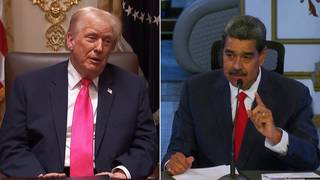
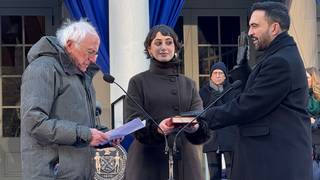
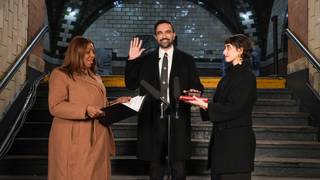



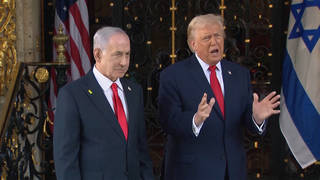

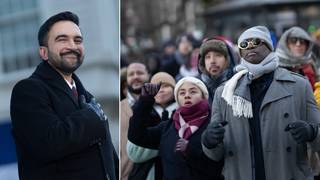

Media Options